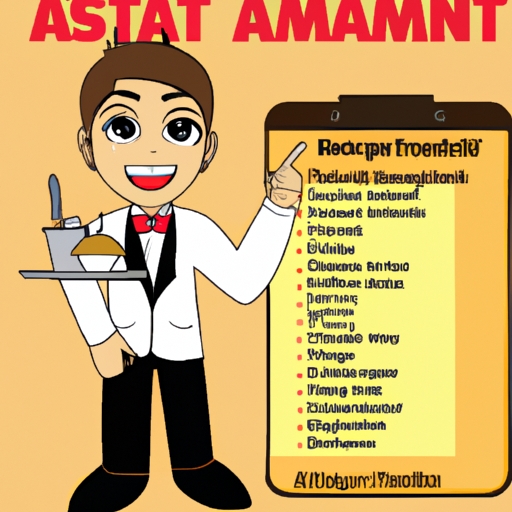An Assistant Restaurant Manager plays a crucial role in ensuring the smooth operation of a restaurant, assisting the General Manager in managing and overseeing daily operations. With a keen eye for detail and exceptional organizational skills, the Assistant Restaurant Manager acts as a valuable support system, handling various administrative and managerial tasks. In this article, we will delve into the comprehensive job description of an Assistant Restaurant Manager, exploring the key responsibilities, required skills, and qualifications necessary to excel in this role. Whether you are an aspiring Assistant Restaurant Manager or simply seeking a deeper understanding of this profession, this article aims to provide you with a thorough overview of the position’s requirements and expectations.
Table of Contents
- Responsibilities of an Assistant Restaurant Manager
- Key Skills and Qualifications for an Assistant Restaurant Manager
- Overview of Daily Duties and Tasks
- Importance of Leadership and Team Management
- Effective Communication Strategies for an Assistant Restaurant Manager
- Financial Management and Budgeting in the Role of an Assistant Restaurant Manager
- Monitoring and Ensuring Food Safety and Quality
- Promoting Excellent Customer Service in the Role of an Assistant Restaurant Manager
- Final Thoughts

Responsibilities of an Assistant Restaurant Manager
An assistant restaurant manager plays a crucial role in the smooth operation of a restaurant. They work closely with the restaurant manager and are responsible for overseeing various aspects of the establishment, ensuring that everything runs efficiently and customers have a remarkable dining experience. Some of the key include:
- Supervising staff: The assistant restaurant manager is responsible for managing and supervising the restaurant staff, ensuring they adhere to the established guidelines and deliver exceptional customer service. They provide necessary training, motivate employees, and address any performance or disciplinary issues that arise.
- Assisting with day-to-day operations: From managing inventory and ordering supplies to creating work schedules and coordinating reservations, the assistant manager handles various operational tasks to maintain the restaurant’s smooth functioning. They ensure that all equipment is in good working condition and that health and safety regulations are followed at all times.
- Handling customer complaints: Excellent customer service is a top priority for any restaurant, and the assistant manager acts as a point of contact for customers who may have complaints or concerns. They strive to resolve issues promptly and ensure customer satisfaction, aiming to enhance the restaurant’s reputation and customer loyalty.
An assistant restaurant manager should possess strong leadership skills, exceptional organizational abilities, and excellent communication skills to effectively manage a team and provide an outstanding dining experience for customers. This role requires the ability to multitask, work under pressure, and make quick decisions while maintaining professionalism. Being a dependable and flexible team player is essential for an assistant restaurant manager to thrive in a dynamic and fast-paced environment.

Key Skills and Qualifications for an Assistant Restaurant Manager
As an assistant restaurant manager, possessing a diverse range of skills and qualifications is crucial to thrive in this dynamic role. Firstly, excellent leadership abilities are essential to effectively manage a team and ensure smooth operations. Strong communication and interpersonal skills enable the assistant manager to effectively collaborate with staff members, convey expectations, and handle customer inquiries or complaints with professionalism.
In addition, sound organizational skills are paramount to maintain an efficient workplace. The assistant restaurant manager should possess the ability to prioritize tasks, coordinate schedules, and oversee inventory management. Furthermore, a knack for problem-solving and decision-making allows for quick resolutions in high-pressure situations. Attention to detail ensures consistency in food quality, compliance with health and safety regulations, and adherence to company policies.
- Leadership: Exhibiting exceptional leadership qualities to motivate and guide the restaurant staff.
- Communication: Demonstrating strong verbal and written communication skills to efficiently communicate with both team members and customers.
- Interpersonal Skills: Fostering positive relationships and promoting teamwork within the restaurant environment.
- Organizational Skills: Maintaining a well-structured and orderly work environment through efficient scheduling, inventory management, and task prioritization.
- Problem-Solving: Displaying the ability to think critically and make effective decisions to address challenges that may arise during daily operations.
- Attention to Detail: Ensuring accuracy and precision in all aspects of restaurant management, including food quality, safety guidelines, and compliance with company policies.

Overview of Daily Duties and Tasks
As an Assistant Restaurant Manager, you will play a crucial role in the smooth operation of our establishment. Your primary responsibility is to assist the restaurant manager in overseeing the day-to-day operations and ensuring that our customers have an exceptional dining experience. Here is an overview of the daily duties and tasks that you will be responsible for:
Supervise and coordinate the activities of restaurant staff, including host/hostess, servers, and kitchen staff, to ensure efficient and timely service delivery.
Monitor and maintain inventory levels of food, beverages, and supplies, and place orders when necessary to ensure uninterrupted operations.
Collaborate with the restaurant manager to develop and implement strategies to maximize sales and profitability, such as promotional events and menu specials.
Uphold high standards of cleanliness and hygiene throughout the restaurant, including the dining area, kitchen, and restrooms, by inspecting and addressing any issues promptly.
In addition, you will also be required to handle customer inquiries and complaints, resolve issues in a professional and timely manner, and provide training and guidance to the restaurant staff. Your attention to detail, strong leadership skills, and ability to work in a fast-paced environment will contribute to the overall success of our restaurant.
Importance of Leadership and Team Management
In any organization, leadership and team management play a crucial role in achieving success. Effective leadership ensures that the team is guided towards accomplishing goals and objectives efficiently. It involves making sound decisions, providing clear direction, and inspiring team members to perform at their best. A strong leader promotes collaboration, fosters a positive work environment, and cultivates a culture of trust and respect among team members.
Team management is equally important as it ensures that the team operates smoothly and cohesively. A skilled team manager assigns tasks and responsibilities, sets clear expectations, and shares feedback to ensure that each team member understands their role and contributes effectively to the overall success of the organization. Additionally, team management involves fostering strong communication, resolving conflicts, and celebrating achievements together. With effective leadership and team management, organizations are more likely to experience higher productivity, increased employee engagement, and improved overall performance.
Effective Communication Strategies for an Assistant Restaurant Manager
As an assistant restaurant manager, possessing strong communication skills is crucial for success in this role. Effective communication is not only about conveying information but also about building rapport, resolving conflicts, and ensuring a seamless flow of operations within the restaurant. Here are some strategies to improve communication as an assistant restaurant manager:
- Active Listening: Give your full attention to both your team members and customers when they are speaking. Demonstrate understanding by nodding, maintaining eye contact, and paraphrasing when necessary. This promotes trust and encourages open communication.
- Clear and Concise Communication: When delivering instructions, sharing feedback, or assigning tasks, be clear and concise to avoid any misunderstandings. Break down complex information into smaller, manageable parts to ensure effective comprehension.
- Utilize Body Language: Nonverbal cues play a significant role in communication. Use positive body language, such as maintaining an open posture and smiling, to create a welcoming environment. Pay attention to others’ body language as well to understand their unspoken thoughts and feelings.
Furthermore, as an assistant restaurant manager, it is essential to establish effective communication channels with your team members. Foster an environment where everyone feels comfortable expressing their ideas and concerns. Regular team meetings can serve as a platform for open dialogue, brainstorming, and problem-solving. Additionally, embrace technology tools, such as instant messaging apps or project management software, to facilitate seamless communication among team members, regardless of their shifts or physical locations.
Financial Management and Budgeting in the Role of an Assistant Restaurant Manager
In order to excel as an Assistant Restaurant Manager, a strong understanding of financial management and budgeting is crucial. As an Assistant Manager, you will be responsible for overseeing the financial aspects of the restaurant, including managing cash flow, creating and analyzing financial reports, and ensuring compliance with budgetary guidelines.
To effectively manage the restaurant’s finances, you will need to possess knowledge of financial software applications and the ability to interpret financial data. This includes analyzing sales trends, identifying areas for cost reduction, and making informed decisions to maximize profitability. Additionally, you will collaborate with the General Manager and other department heads to establish and monitor budgets, ensuring that expenses align with revenue projections and that the restaurant operates within financial constraints.
To stay organized and efficient in managing the financial aspects of the restaurant, strong attention to detail and accuracy is essential. This includes maintaining up-to-date records of all transactions, reconciling accounts, and preparing accurate and timely financial statements. By regularly reviewing financial statements, you will be able to identify any discrepancies or areas of concern, allowing you to take corrective action and implement strategies to improve financial performance.
In summary, as an Assistant Restaurant Manager, a solid understanding of financial management and budgeting is essential for ensuring the financial success of the establishment. Through careful analysis, accurate record-keeping, and strategic decision-making, you will play a vital role in maximizing profitability and maintaining financial stability.
Monitoring and Ensuring Food Safety and Quality
As an Assistant Restaurant Manager, you will play a crucial role in maintaining the highest standards of food safety and quality within our establishment. It will be your responsibility to implement and oversee a comprehensive monitoring system to ensure that all food handling and preparation procedures are in strict adherence to regulatory guidelines and industry best practices.
To effectively monitor and ensure food safety and quality, you will need to:
- Regularly inspect the kitchen, storage areas, and equipment to identify any potential hazards or issues that could compromise the safety and quality of our food products.
- Perform routine temperature checks on refrigerated and cooked foods to guarantee that they are stored and served at safe temperatures.
- Train and educate restaurant staff on proper food handling, storage, and cooking techniques, emphasizing the importance of hygiene and sanitation.
- Implement a system for accurately documenting and tracking the expiry dates of all perishable food items to prevent the use of expired ingredients.
- Collaborate with suppliers and conduct quality audits to ensure that only fresh and high-quality ingredients are used in food preparation.
By diligently monitoring and enforcing these measures, you will contribute to the continued success of our establishment by providing our valued customers with a safe and enjoyable dining experience, while upholding our commitment to food safety and quality.
Promoting Excellent Customer Service in the Role of an Assistant Restaurant Manager
In the role of an Assistant Restaurant Manager, promoting excellent customer service is a crucial aspect of ensuring the success of the establishment. As a representative of the restaurant, you will have a direct impact on the overall dining experience of our valued customers. Here are some key responsibilities that contribute to maintaining outstanding customer service:
- Team Management: Effectively lead and motivate a team of servers, bartenders, and other staff members to deliver exceptional service. Provide training, guidance, and support to ensure all staff members understand and consistently adhere to service standards.
- Customer Relations: Foster a welcoming and friendly environment, addressing customer concerns or complaints promptly and professionally. Actively engage with customers to build rapport, gather feedback, and ensure their needs are met throughout their dining experience.
- Quality Assurance: Monitor the service process, ensuring that all aspects of dining, such as food quality, cleanliness, and presentation, meet or exceed customer expectations. Regularly assess service standards and implement necessary improvements.
Additionally, strong communication and organizational skills are crucial to coordinate with the restaurant manager, kitchen staff, and suppliers to maintain a smooth service flow and timely delivery of orders. Upholding policies and procedures regarding health and safety regulations is of utmost importance to ensure a safe dining environment.
Final Thoughts
In conclusion, the role of an assistant restaurant manager is one that requires a combination of leadership, organizational skills, and a deep understanding of the hospitality industry. This position plays a crucial role in ensuring the smooth operation of the establishment by overseeing various aspects, including staff management, customer service, and financial responsibilities. The assistant restaurant manager serves as a bridge between the upper management and the staff, working diligently to maintain high standards of quality, efficiency, and customer satisfaction.
As outlined in this article, the job responsibilities of an assistant restaurant manager are diverse and demanding. They involve supervising and training employees, ensuring compliance with health and safety regulations, managing inventory and supplies, and contributing to the development of marketing strategies. Successful candidates should possess excellent communication and problem-solving skills, as well as the ability to work effectively within a team.
Furthermore, a strong candidate for this role should have prior experience in the food service industry, ideally in a managerial or supervisory capacity. A bachelor’s degree in business administration, hospitality management, or a related field is often preferred by employers. Additionally, possessing a food handler’s certificate or other relevant certifications can be advantageous.
In conclusion, the role of an assistant restaurant manager offers exciting opportunities for career growth and advancement within the culinary industry. With the right set of skills, qualifications, and dedication, this position can be incredibly rewarding. If you are someone who thrives in a fast-paced, customer-focused environment and possesses the necessary leadership qualities, then pursuing a career as an assistant restaurant manager may be the right path for you.
